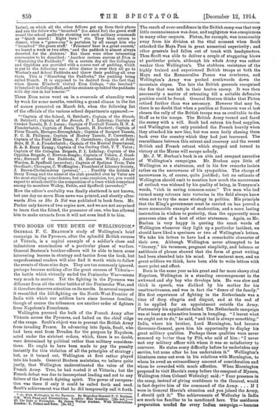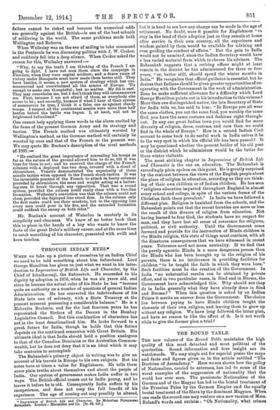TWO BOOKS ON THE DUKE OF WELLINGTON.* GENERAL F. C.
BEATSON'S study of Wellington's brief campaign in the Pyrenees, after the splendid British success at Vittoria, is a capital example of a soldier's close and industrious examination of a particular phase of warfare. General Beatson's brother-officers will be able to learn some interesting lessons in strategy and tactics from the book, but unprofessional readers will also find it worth while to follow the events of those nine days. They are too commonly ignored, perhaps because nothing after the great success of Vittoria— the battle which virtually ended the Peninsular War—seems very much to matter. Yet the fighting in the Pyrenees was different from all the other battles of the Peninsular War, and it therefore deserves attention on its merits. In several respects it resembled the hill-fighting on the North-West Frontier of India with which our soldiers have since become familiar, though of course the tribesmen are another 'order of fighters from Napoleon's Frenchmen.
Wellington pursued the bulk of the French Army after Vittoria across the Pyrenees, and halted on the chief ridge of the range. Soult's object was to prevent the British Army from invading France. In advancing into Spain, &nit, who had been sent from Dresden for the purpose by Napoleon, acted under the strictest orders, which, there is no doubt, were determined by political rather than military considera- tions. He ought to hare been made to pay the penalty instantly for this violation of all the principles of strategy ; but, as it turned outs Wellington at first rather played into his hands. General Beatson maintains, we believe quite justly, that Wellington underestimated the value of the French Army. True, he had routed it at Vittoria; but the French defeat was due to incompetent leading and not to any failure of the French fighting spirit. The power of recupera- tion was there if only it could be called forth and used. Soult's achievement was that he did temporarily call it forth.
• (1) With Wellington in the Pyrenees. By Briodier-Genera F. C. Beason, C.B. With Plans and illustrations. London: Max Gottalten. net.]— (2) The Duke of Wellington. By James Walter 13nelatin. With Illuitratioas. London: T. Nelson and Bons. Ds. 6c1.3 The result of over-confidence in the British camp was that verY little reconnaissance was done, and negligence was conspktions in many other respects. Picton, for example, was inexcusably away from his division at the vital moment when Soult attacked the Maya Pasi in great numerical stiperiority ; and other generals had fallen out of touch with headqtartere. Thus Soult Wed able to &liter a couple of staggering blown at particular points, although his whole Arthy was rather weaker than Wellington's. The stubborn resistance of the highly trained and experienced British troops at both the Maya and the Rottcesvalles Passes was Overborne, and Wellington's Army was pushed sonthivards down the mountain slopes. Too late the British generals recognized the fire that was left in their beaten enemy. It was then necessarily a matter of retreating till a suitable defensive position could be found. General Beatson thinks that Pictoti retired further than was necessary. However that may be, there is no doubt that when a position at Sorauren was at last chosen the rally of the British troops was as creditable to the Staff as to the troops. The British Army turned and faced the enemy with a wilL Soult had outrun his food supplies, and Wellington net only punished the French heavily when they attacked his new line, but was soon hotly chasing them back over the country which they had just traversed. The resemblance between this retreat and recovery and the recent British and French retreat which stopped and turned to victory at the Marne will escape nobody.
Mr. J. W. Buchan's book is an able and compact narrative of Wellington's campaigns. Mr. Buchan says little of Wellington as a statesman, and in his few remarks insists rather on the narrowness of his sympathies. The charge of narrowness is, of course, quite justified ; but no estimate of Wellington should omit to mention how much the narrowness of outlook was widened by his quality of being, in Tennyson's words, "rich in saving common-sense." The man who had turned many retreats into victories in the field always knew when not to try the Same strategy in politics. His principle that the King's government must be carried on has proved a more memorable example of Moderation, and a more lasting instruction in wisdom to posterity, than the apparently more generous aims of a host of other statesmen. Again, as Mr. Btichan is very happy in quoting the exact words of Wellington whenever they light up a particular incident, we should have liked a specimen or two of Wellington's letters. We take his letters to have had a remarkable character of their own. Although Wellington never attempted to be "literary," his terseness, pregnant simplicity, and balance or antithesis of phrase showed that the form of great writing had been absorbed into his mind. Few eminent then, and no great soldiers we think, have been able to write letters with more point and effect. Born in the same year as his great and far more showy rival Napoleon, Wellington is a standing encouragement to the awkward and shy boy who develops late. He was Slow and thick in speech, was disliked by his mother for his unattractiveness, and was in fact the "dunce of the family:" His first experience of fighting in the Netherlands was a time of deep chagrin and disgust, and at the end of it be applied for an appointment outside the Army. Fortunately his application failed. The Netherlands campaign was at least an exhaustive lesson in bungling. "I learnt what we ought not to do," he said, "and that is always something." India, where his brother, Lord Mornington, had become Governor-General, gave him his opportunity to display his great military qualities. Perhaps these qualities were never summed up better than by Pitt, who said of him : "I never Met any military officer with whom it was so satisfactory to converse. He states every difficulty before be undertakes any service, but none after he has undertaken it." Wellington's bluntness came out even in his relations with Mornington, to whom he owed an extraordinary amount of consideration and whom he rewarded with much affection. When Mornitigton proposed to visit Harris's camp before the conquest of Mysore, Wellington (then Colonel Wellesley) said : " Your presence in the camp, instead of giving confidence to the General, would in fact deprive him of the command of the Army. . . If I were in General Harris's situation and you joined the Army, I should quit it." The achievements of Wellesley in India are much too familiar to be mentioned here. The assidnoini preparation needed for every Indian campaign a- because
failure cannot be risked and because the numerical odds are generally against the British—is one of the best schools of soldiering in the world. The same problems made both Wellington and Roberts.
When Wellesley was on the eve of sailing to take command in the Peninsula he was discussing politics with J. W. Croker, and suddenly fell into a deep silence. When Croker asked the reason for this, Wellesley answered
"Why, to say the truth I am thinking of the French I tall going to fight. I have not seen them since the campaign in Flanders, when they were capital soldiers; and a dozen years of victory under Bonaparte must have made them better still. They have besides, it seems, a new system of strategy which has out- manceuvred and overwhelmed all the armies of Europe. 'Tis enough to make one thoughtful; but no matter. My die is cast. They may overwhelm me, but I don't think they will outmanceuvre me. First, because I am not afraid of them, as everybody else seems to be ; and secondly, because if what I hear of their system of rnanceuvres be true, I think it a false one as against steady troops. I suspect all the continental armies were more than half beaten before the battle was begun. I, at least, will not be frightened beforehand."
One cannot help applying these words to the alarm excited by the fame of the present German Army and its strategy and tactics. The French method was ultimately worsted by Wellington's method, as the German method will certainly be worsted by ours and that of the French in the present war. We may quote Mr. Buchan's description of the rival methods of 1808 :--
"He realized the great importance of concealing his troops as far as the nature of the ground allowed him to do so, till it was time for them to act ; and he received the charge of the French columns with a deployed line two deep, covered with a cloud of skirmishers. Vimeiro demonstrated the superiority of these missile tactics when opposed to the French shock-tactics. It was the invariable practice of the French to attack in heavy columns preceded by skirmishers, the mass and weight acting as a batter- ing-rain to break through any opposition. That was a sound system, provided the column could really close with a two-line formation. Wellesley's conviction was that the column could not close, provided the deployed line stood firm. In the column only the first ranks could use their muskets, but in the opposing line every man could pour in his fire, and the extended formation could outflank the enemy on both sides."
Mr. Buchan's account of Waterloo is masterly in its simplicity and clearness. We know of no better book than this to place in the hands of a boy who wants to know the facts of the great Duke's military career, and at the same time to catch something of his character, presented with swift and keen touches.















































 Previous page
Previous page